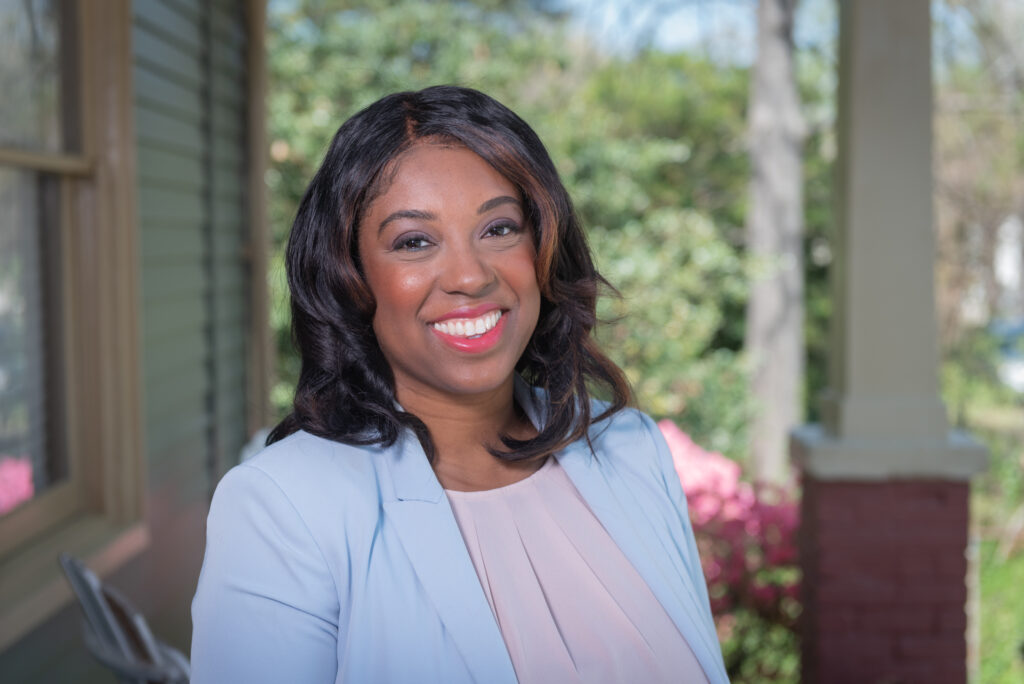
Sen. Lashrecse Aird is a member of the Virginia Senate and served previously as an elected member of the House of Delegates for six years. She is currently serving on commissions such as the Joint Commission on Technology and Science, and its Artificial Intelligence Subcommittee. ESAL interviewed Sen. Lashrecse about her experience working at the state level to develop policy on artificial intelligence.
This interview has been edited for clarity and length.
MFD: Can you tell us about your experience as a Virginia senator and your experience with AI policy?
Aird: This is my first year of a four-year term. I previously served in Virginia's House of Delegates for six years, which was where my journey in science policy began. As someone who grew up with very humble beginnings, I've seen people's suffering and the social challenges that exist and have catapulted those issues through a technological lens.
During my six years in the House, I worked on legislation that was specific to criminal justice reform, environmental justice, economic justice, and maternal health, among other similar social issues. What I came to learn is that many of the battles that we continue to fight in those categories have now transitioned to technological battles. So much decision-making, so many tools, and so many individuals are now looking to emerging technologies to aid them in resolving different types of issues.
Back in 2020, while I was still in the House, I introduced legislation in Virginia that would have merely conducted an assessment of how the commonwealth of Virginia currently interacts with various artificial intelligence (AI) tools, be it the Department of Education, or the Department of Health, Transportation. We wanted to know how we are currently allowing our state agencies to utilize these tools. And I was really surprised that at my doorstep were your Amazons, your Googles. And they said to me that the state has no business interfering in this type of policy and that it should be left to the federal government. And so, we did not conduct the assessment at the time. Well, here we are, how many years later, and the federal government has not been able to move forward comprehensive legislation in this regard.
I'm excited about the direction that we're moving in now and the progress that we're making. This past legislative session, 2024, I introduced what’s called Senate Bill 487, which specifically combats the use of algorithms by public bodies by requiring both state agencies and local governments to have a series of metrics that they must verify from an accountability standpoint before they adopt a tool.
MFD: How did AI specifically come to your attention?
Aird: I got to this issue through algorithmic bias. That is where I first began to learn more about data sets, and about the accountability that we are asking developers to have. Because I had been working in other spaces around combating bias, particularly in maternal health and with other decisions that are made on behalf of impoverished people, I began to learn that some of this decision-making is now being handed off to some of these tools that are in existence now. That opened the door wide open to look into a lot of other areas like facial recognition, technology, surveillance, blockchain, and other emerging technologies.

I know it's so sexy now, but when I was first beginning as a policy maker to talk about it, I was a younger member in the General Assembly. And people would just glaze over! It was not as popular as it is now. It was not likened as a tool that everyone had access to. There was a learning curve for policymakers, and that's why I wanted to start with the assessment.
I think the fear is that policymakers are going to come out and ban products, that our policymakers are going to put regulations in place that are so stringent that it stymies development, research, and evolution of the technology. But that is not at all the intention. I think, as policymakers, we have an obligation to adopt an agreed-upon set of principles regarding how we interact with this technology so that citizens know exactly what is being used on their behalf and know how they are being affected by it.
MFD: What are your thoughts on how states in general can engage with AI in a way that the federal government can't? How has Virginia, in particular, engaged with it so far?
Aird: I think the way I would look at it, is that every state is different. And when the federal government acts on a policy, no matter what unique nature exists for a state, what the needs are for those citizens, you are forced to confine to that one policy. However, as it is structured, states have the opportunity to structure policies that are based solely on the unique nature and needs of their constituency. I mean, think about the geographic diversity that exists in this country!
I love that the federal government has put out aspirational language on AI regulation. This has generated interest and has developed a task force and working groups. There has been legislation introduced, but it has, as I mentioned before, not gone anywhere. And so I think states have a responsibility and obligation to act in its absence.
In Virginia, we have what's referred to as VITA, Virginia's Information Technology Agency, which has put in place some internal regulatory requirements for how the state agencies are currently assessing the various AI tools that they are using. But then you drop down to the local government, the governing bodies for cities and counties, and that requirement isn't there, and that's a level of inconsistency.
Virginia was very fortunate to be one of the first states to pass a Consumer Data Protection Act. But what we also see is that the act is missing what has become standard practice by other variations of that law in other places. Because it is outdated, that will affect any comprehensive AI policy that we put in place since privacy is the foundation for any comprehensive AI policy. I think the biggest problem in Virginia right now is that you have a patchwork of approaches as it pertains to accountability and as it pertains to the type of tools you can adopt and use. And we just want to make sure we have some consistency there, that you're not utilizing something that can be discriminatory, or putting someone’s data at risk.
For example, Virginia is very new to using automatic license plate readers. We’re seeing several localities throughout the state working with a specific company to set this technology up, but there is no regulatory structure for how often the data is pulled, the storage of that data, and additionally, the ability to hold these developers accountable.
MFD: Is there a way for interested individuals to get involved with Virginia's work on AI?
Aird: Right now, at every Joint Committee on Science Technology meeting, we allow for public comment, for advocates and for experts and practitioners to weigh in on the discussion, to ask questions, and to say, "Hey, you might want to rethink your approach to this." That is the stage that we are in, the sausage-making stage right now.In fact, at our September meeting, we will have our preliminary discussions about a recommendation for the comprehensive bill that will come before the General Assembly in 2025. This will literally be the difference between whether legislators are moved to vote for the bill or not. And I hope they will. We desperately need it. We're in the wild wild west right now when it comes to AI from a regulatory standpoint, and I invite the practitioners to come in and tell us whether we know what we're doing or not.
Do you have a story to tell about your own local engagement or of someone you know? Please submit your idea here , and we will help you develop and share your story for our series.